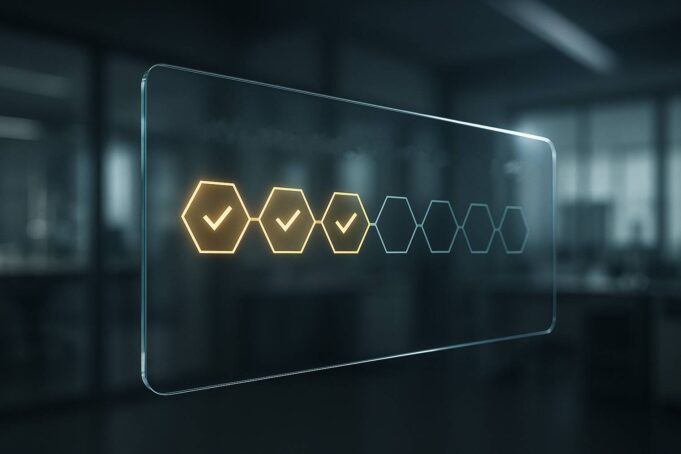Decentralized research startup Crunch Lab has secured $5 million in new funding led by Galaxy Ventures, Road Capital, and VanEck Digital Assets. This cash injection enables the company to expand its blockchain-powered prediction platform that connects scientists, developers, and enterprises seeking transparent and verifiable collaboration in AI and data modeling.
The raise highlights a broader shift in blockchain adoption. Investors are starting to see that blockchain applications go far beyond cryptocurrency. When paired with AI, blockchain becomes more than a digital ledger; it becomes a trust layer for verifiable intelligence across industries.
Institutional Capital Enters the Decentralized AI Race
For VanEck, the investment in Crunch Lab marks a strategic entry into decentralized AI. This sector is drawing attention from institutional funds that see blockchain as a coordination system rather than a speculative asset.
VanEck’s participation, alongside Galaxy Ventures and Road Capital, shows that institutional adoption of decentralized AI is now moving from concept to execution. These investors have previously focused on infrastructure rather than token speculation, adding weight to Crunch Lab’s credibility.
Just as institutional capital once validated tokenization and stablecoins, the Crunch Lab funding round could become a turning point for AI blockchain projects that serve research and enterprise needs.
Crunch Lab’s Core: A Decentralized AI Network
At the heart of Crunch Lab’s work is a decentralized AI network built to crowdsource model development through blockchain incentives. The platform connects thousands of data scientists who contribute algorithms and are rewarded based on performance and reproducibility.
Each contribution is verified through on-chain data validation, providing transparency in how models are trained and scored. Thus, the process addresses one of AI’s biggest challenges: accountability. Crunch Lab calls this framework the “intelligence layer” for decentralized AI. Its open infrastructure balances collaboration, ownership, and enterprise control.
The Lab evolved from CrunchDAO, a research collective where contributors compete in predictive modeling challenges. Their work feeds into the AI prediction network that carries Crunch Lab’s commercial platform. Together, these systems translate decentralized collaboration into enterprise-ready intelligence tools.
Blockchain in Healthcare and Science: Real-World Validation
Crunch Lab’s best-known experiments come from research partnerships with Harvard and MIT teams. These projects used the Crunch framework for cancer-detection modeling and showed that blockchain can secure sensitive healthcare research data while preserving transparency.
The results highlight how Decentralized Science (DeSci) is transforming research integrity. Every contribution to a model is recorded immutably, allowing independent verification and reproducibility. In effect, blockchain acts as a peer-review mechanism where every dataset and update is traceable.
Beyond healthcare, Crunch Lab’s contributors also apply similar methods to climate modeling and financial forecasting. These initiatives show that blockchain applications are already improving the reliability of AI across scientific and commercial fields.
From Research to Enterprise Integration
Crunch Lab’s evolution mirrors a larger market trend in which enterprises adopt blockchain as a trust framework for data-driven systems. In practice, its APIs allow companies to integrate decentralized models into business workflows, test them on private datasets, and deploy predictive tools without revealing sensitive information.
Moreover, this dual approach of open collaboration paired with privacy explains why VanEck’s investment strengthens Crunch Lab as a potential leader in blockchain and AI integration. As a result, companies facing regulatory or audit pressure gain a cryptographically verifiable layer that preserves transparency while protecting proprietary data. Ultimately, that combination of traceability and confidentiality is what moves decentralized AI from research labs into production environments.
The Funding Roadmap: Building the Intelligence Layer
Through this funding, Crunch Lab will accelerate development across three key areas: scaling the infrastructure, expanding developer tools, and onboarding new contributors worldwide. The company will allocate parts of the capital to enhance cross-chain interoperability and optimize infrastructure that can handle higher-frequency model updates.
The team also plans to release enterprise APIs and on-chain verification tools to help companies measure and report AI transparency. This will become an increasingly important metric under upcoming global AI governance rules.
Positioning Among AI–Blockchain Projects
Projects such as Fetch.ai, SingularityNET, and Ocean Protocol also explore synergies between blockchain and AI. Crunch Lab differentiates itself through verified research outputs and academic collaborations. Its partnership-driven model blends open science with enterprise software.
This mix of scientific credibility and institutional support positions Crunch Lab among the most credible AI blockchain projects of 2025.
>>> Read more: 2025 Crypto Predictions: Bold Insights
Why It Matters: Blockchain’s Broader Role
The Crunch Lab funding represents more than another startup milestone. It signals blockchain’s evolution into infrastructure for knowledge verification. As blockchain use expands into AI, healthcare, and science, the technology’s defining strength, trust through transparency, finds real utility beyond digital currencies.
Enterprises, researchers, and developers are now adopting these frameworks to ensure data integrity and reproducibility at scale. Crunch Lab’s progress shows how real-world blockchain utility is shifting from finance to the foundation of a decentralized intelligence economy.
What Is In It For You? Action items you might want to consider
Verify the news and avoid scams
Double-check the funding details on Crunch Lab’s official announcement and the PR wire, and confirm investor names (Galaxy Ventures, Road Capital, VanEck Digital Assets). Be wary of fake “airdrop” links or supposed new tokens—this raise did not introduce a tradable token.
Track decentralized-AI adoption signals
Set alerts for “Crunch Lab,” “VanEck Digital Assets,” and “decentralized AI network.” Watch for pilot announcements in healthcare or finance; those will indicate whether on-chain verification and reproducibility are gaining traction beyond crypto.
Explore participation without risk
If you’re curious about the tech, follow CrunchDAO’s public research challenges and read their documentation before engaging. Start by observing or testing with non-sensitive data; you don’t need to connect funds or share private information to learn how the approach works.
Readers’ frequently asked questions
Is there a consumer app I can try, or is Crunch Lab mainly for researchers and businesses?
It’s primarily aimed at researchers and enterprises. Individual contributors can participate via CrunchDAO’s modeling challenges. However, there isn’t a mainstream consumer app tied to this funding announcement.
Can an enterprise test Crunch Lab’s decentralized AI network without exposing private data?
Yes. Crunch Lab says it provides APIs and on-chain verification tools that let teams evaluate models against their own datasets without sharing raw data. Typical next steps: request sandbox/API access, run a pilot on non-production data, review the verification logs, and then proceed under an NDA if you move to production.
Is there a tradable token tied to this funding round, and how do individual contributors participate?
The funding announcement does not introduce a new token. Contributors receive rewards through CrunchDAO’s existing research programs. To participate: create an account, link a wallet, review the submission rules, and enter modeling challenges where rewards are based on performance and reproducibility. Always confirm current rules on Crunch Lab / CrunchDAO’s official documentation before committing resources.











[…] >>> Read more: Crunch Lab Funding: VanEck Backs $5M DeAI Push […]